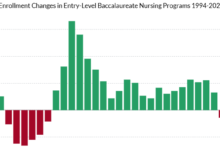Watchdog report reveals ‘turmoil’ within health and care

Nursing staff are so overworked that they are becoming ill or leaving their job completely, as recruitment and retention of staff remains the biggest challenge across health and care, a damning report by the health and care regulator has revealed.
Today the Care Quality Commission published its annual State of Care report, which laid bare some of the critical challenges facing health and care services across England.
“This is the damning consequence of ignoring nursing staff and not listening to their warnings about services they work in every day”
Nicola Ranger
In the report, presented to parliament, the regulator highlighted areas where patients were particularly at risk, including maternity and mental health services.
Representatives from across the sectors have reacted to the report, with nurse leaders warning that workforce shortages in the profession underpin the “turmoil” that is taking place across the systems.
The CQC report used data from its inspections and ratings from 2022-23, along with anecdotal evidence from annual surveys, to asses the state of health and social care in England.
Nursing Times has broken down some of the key takeaways from the 150-page report.
The wellbeing of the health and care workforce
Higher demand and more pressure in the health and care system has continued to affect the health and wellbeing of staff, the CQC warned.
The report found that staff working across health and care services were “overworked, exhausted and stressed” to the point of becoming ill, injured or leaving their job entirely.
Staff reported that without having the appropriate mental health support in place, it was affecting the quality of care they were able to deliver.
Some had made errors with medicines, felt they were not respecting patients’ choices and were giving people worse or less care than they needed, the report said.
The CQC noted that issues around staffing affecting safety and quality of care was a theme that had emerged from all areas it had inspected this year.
The regulator said that despite organisations’ attempts to address workforce shortages, concerns remained about nursing and support staff shortages affecting the safety of services.
Pay and terms and conditions
Meanwhile, pay was also a significant factor causing dissatisfaction of staff working within health and care.
According to the 2022 NHS staff survey results, just a quarter (26%) of NHS staff were satisfied with their level of pay.
The CQC noted that pay was at the epicentre of industrial action which has taken place across the NHS over the last year, including strikes by nursing staff.
Many health unions had been advocating for pay increases for staff that were in line with inflation amid the ongoing cost of living crisis.
However, this had caused a particular problem within adult social care, the CQC noted, as many providers have struggled to pay their staff an inflating-matching wage, which was impacting recruitment and retention in the sector.
Over half of respondents to the CQC’s survey of adult social care providers in England said they were having trouble recruiting new staff, while 31% said they were having trouble retaining them.
The State of Care report also warned that the cost-of-living crisis had “pushed some care staff into vulnerable financial positions” which meant employers were having to support them with essentials like food, fuel and toiletries.
The CQC said recent publication of the NHS Long Term Workforce Plan had been a “positive step in addressing workforce pressures” but warned that implementing it would be challenging without a social care plan to sit alongside it.
The regulator called for a national workforce strategy for social care that “raises the status” of the workforce and ensures career progression, pay and rewards to attract and retain the right staff.
Responding, the chief executive of Care England, Martin Green, said: “Social care must be seen as an essential part of national infrastructure.
“The social care sector is brimming with talent and provides essential support for our citizens.
“We need a government that understands the importance of social care and sets about creating an environment where it flourishes, rather than struggles.”
Nursing shortages in mental health care
The CQC warned that, while recruitment and retention challenges were a problem across health and care, they were most prominent in mental health services in England, citing the fact that bank and agency use was “higher than ever” in the field.
The use of agency staff “puts pressure on permanent staff” and was increasing the risk to people using services as staff do not always know them, said the report.
It highlighted recent NHS England data, which revealed that, at the start of 2022-23, almost one in five mental health nursing posts were vacant.
The regulator had been issuing warning notices to NHS and independent mental health care providers because of staff shortages, particularly around not having enough registered nurses.
In one organisation which it was following up, the CQC said it was concerned to find that there was only one full-time registered nurse in the service and that it was over-reliant on bank and agency staff “who didn’t understand people’s individual needs”.
Quality of maternity care
The health and care regulator particularly spotlighted maternity care in this report, noting the focused maternity inspections that had been taking place this year which have aimed to provide an up-to-date view of the quality of hospital maternity care across the country.
However, the regulator said that, so far, the reports were painting a picture of services and staff “under huge pressure”.
As of September 2023, the regulator had inspected 73% of maternity services and found that there were ongoing issues around quality.
So far, the CQC inspections found that 10% of maternity services in England had been rated ‘inadequate’ overall, while 39% were rated as ‘requires improvement’.
Safety and leadership were particular areas of concern, with 15% of services rated as ‘inadequate’ for their safety and 12% rated as ‘inadequate’ for being well-led.
Women and other people using maternity services have continued to face “inherent inequalities”, warned the latest report.
Alongside its programme of maternity inspections, the CQC commissioned a series of interviews with midwives from minority ethnic groups to explore their experiences of working in maternity services and their insights into safety issues.
They told the regulator that care for people using maternity services was affected by racial stereotypes and a lack of cultural awareness among staff.
Midwives from minority ethnic backgrounds described a “normalised” culture where staff tolerated discrimination from colleagues.
The CQC said that there was “a huge amount to be done” in terms of tackling inequitable care of patients and experience within the workforce.
In response, the chief executive of the Royal College of Midwives, Gill Walton, said: “Despite numerous warnings, and the raft of policy initiatives and programmes in recent years, maternity care ratings are getting worse.
“This is not a reflection of the people that work in maternity services, far from it.
“They are dedicated, compassionate and working long hours, including unpaid overtime to support women and their families.
“Instead the findings expose the legacy of a continued lack of investment in maternity services.”
Unethical international recruitment practices
The CQC noted, as has been widely reported before, that health and care services have become increasingly reliant on employing internationally educated staff to plug gaps in the workforce.
It comes as a review published by the Nursing and Midwifery Council (NMC) earlier this year revealed that almost half of those who joined the register in the last year were educated outside of the UK.
In the CQC’s interviews with midwives, respondents warned that internationally educated staff were not being fully embedded within organisations, with some feeling that the experience and knowledge of internationally trained midwives were “not respected”.
The regulator also warned of “a growing trend” of unethical international recruitment practices, which had seen international workers being controlled and coerced through their immigration visa or through debt bondage.
There had also been increased concerns around modern slavery and human trafficking, with the CQC making 27 referrals in 2022-23 – four times more than the prior year.
Two-tier system of healthcare
Earlier this year it was revealed that there were a record 7.7 million people in England waiting to start treatment on the NHS.
The CQC said this was exacerbating existing health inequalities, as some people had begun to turn to private healthcare.
The report noted that a recent survey of 2,000 people, commissioned by the Independent Healthcare Provider Network (IHPN), showed that 46% of those who had used private healthcare said being unable to get an NHS appointment was a factor in their decision.
The CQC warned that this had increased the risk of a “two-tier system of healthcare” where people who cannot afford to pay for care are having to wait longer and risk deteriorating health.
An adult inpatient survey, based on feedback from more than 63,000 people, found that 41% felt their health deteriorated while they were on a waiting list to be admitted to hospital, the report noted.
Responding, the chief executive of the IHPN, David Hare, said: “Independent providers work hand in glove with the NHS every day to deliver the best possible services to patients.
“The sector is ready to increase its support of the NHS – there is capacity to deliver more high-quality care, and we are committed to working with the NHS to get patients the treatment they need as quickly as possible.”
Reactions from health and care leaders
The NMC chief executive and registrar, Andrea Sutcliffe, said the CQC report was “another stark reminder of the struggles people face in accessing high-quality care”.
She said: “As workforce pressures continue, the findings show just how crucial it is that professionals have the right support and resources in place to deliver the safe, kind and effective care everyone, especially those in the most vulnerable circumstances, deserves.”

Andrea Sutcliffe
Ms Sutcliffe described the spotlight on midwifery care as “important and sobering”, noting that it was clear that discrimination was “undermining the quality-of-care professionals provide” and leading to worse outcomes for mothers and babies.
She added that the poor experiences of mothers and babies from minority ethnic backgrounds was “incredibly concerning” and stressed that the regulator wanted women to feel confident that they will receive safe and effective care.
“Nurses, midwives and nursing associates make an essential contribution to people’s health and wellbeing, but it’s clear they need adequate resources and the right support and leadership, to provide the best care they can,” said Ms Sutcliffe.
Meanwhile, the Royal College of Nursing chief nurse, Professor Nicola Ranger, said the report revealed “the shocking state of care”.
She said: “Across maternity, social care, mental health and acute settings, the whole system is in turmoil.
“Health and care services can no longer be there for us when we need them.
“This is the damning consequence of ignoring nursing staff and not listening to their warnings about services they work in every day.”

Nicola Ranger
Professor Ranger said the heart of the issues laid out in the report was the crisis in the workforce.
“There aren’t enough nursing staff, meaning those in the system are spread too thin, unable to give the outstanding patient care they strive to deliver,” she said.
“Politicians on all sides should hear the alarm bell ringing.
“They can begin to improve services by investing in the nursing workforce.
“If you protect nursing, you protect the public.”
The chief executive of the NHS Confederation, Matthew Taylor, echoed this, and said: “This sobering report lays bare the critical state that the NHS is in and should provide a salutary warning to political leaders about the abundance of issues facing the health service and the scale of the recovery task ahead.
“After a decade of under-investment in staff, buildings and infrastructure, it is no surprise that we are in this position.
“We now need a credible plan that helps NHS leaders recover services and rebuild public confidence in what has always been one of the UK’s most valued institutions.”
In response to the report, a Department of Health and Social Care spokesperson said: “It is vital we provide patients with the level of care they expect and deserve.
“That’s why we are delivering on three major recovery plans to improve access to urgent and emergency, primary and elective care, and have made progress to significantly reduce the longest waits for routine treatment, despite pressures including industrial action.”
The spokesperson said the government was investing “record sums into health and social care services” to improve access to care and cut waiting lists, which includes £8.1bn “to put the adult social care system on stronger footing”.
“There are record numbers of staff working in the NHS and our historic long term workforce plan will retain and recruit hundreds of thousands more staff alongside harnessing technology to reform the way we work and save staff time,” they added.





